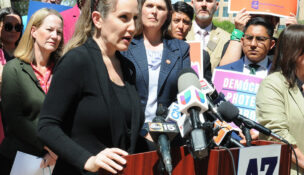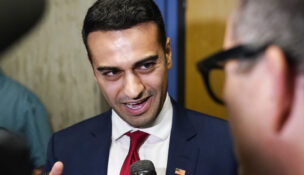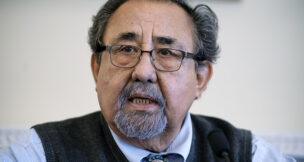State tax collector wants Prop 208 to take effect
Howard Fischer, Capitol Media Services//December 28, 2020//
State tax collector wants Prop 208 to take effect
Howard Fischer, Capitol Media Services//December 28, 2020//
The state Department of Revenue wants a judge to quash efforts by business interests and some Republican legislators to keep a new tax to fund education from taking effect.
And it puts the agency, a division of the state, somewhat at odds with Gov. Doug Ducey, who had urged voters, unsuccessfully, to defeat the measure.
Brian Bergin, an attorney hired by the state in the legal fight, is telling Maricopa County Superior Court Judge John Hannah there is no legal justification for him to bar enforcement of the new 3.5% income tax surcharge on the wealthy approved by voters in Proposition 208. If nothing else, Bergin said, there’s no rush to deal with it because the earliest people would actually owe the tax is April of 2022.
Bergin also said an injunction is inappropriate because the challengers have not demonstrated they ultimately will win the case.
But the most crucial point, according to Bergin, is that an order precluding the state from collecting the tax would be illegal.
He points out that state law specifically prohibits courts from enjoining the collection of any tax.
The reason, Bergin told Hannah, is that to allow a court to block collection of a disputed tax would undermine the government’s ability to function. And he said if a tax is later determined to be illegal, there is a simple remedy: Those who paid it can seek a refund.
Beyond that, Bergin said the judge needs to think long and hard before undermining the voter-approved tax.
“The Arizona Supreme Court has long recognized Arizona’s strong public policy favoring initiatives,” he wrote. And Bergin said that under the Arizona Constitution the power of people to create their own laws is equal to that of elected legislators.
“Courts must exercise restraint before imposing unreasonable restrictions on the people’s legislative authority,” he told Hannah. “Additionally, every initiative is presumed to be constitutional.”
That, Begin wrote, is true here.
“Proposition 208 apparently reflects the voters’ belief that the state’s educational system is underfunded and requires additional permanent funding that the legislature has been unable, or unwilling, to provide,” he said.
“The people have spoken in approving Proposition 208,” Bergin continued. “Public policy heavily weighs against imposing injunctive relief.”
Bergin’s position as attorney of record for the state and its Department of Revenue puts him — and his clients — in an unusual position.
Prior to the November election, the governor decried trying to raise $940 million for K-12 education — the estimate provided by Prop 208 supporters — on the backs of the top 4% of Arizona wage earners.
“That’s a whopping amount, especially considering that our economy is recovering from recession and high unemployment,” he wrote in a prepared statement of opposition.
It wasn’t just Ducey among state officials opposed to the measure.
Fellow Republican Kimberly Yee, the state treasurer, appeared in TV commercials asking voters to reject the measure.
By contrast, state schools chief Kathy Hoffman came out in support.
Bergin makes no reference to all of that in his legal arguments. Instead he is telling Hannah that the law is not on the side of those who want to block the tax.
The underlying lawsuit claims voters have no right to levy a tax on their own, saying that power is reserved for elected legislators.
And Dominic Draye, representing the challengers, says even if they do — a point he is not conceding — voters are subject to the same constitutional requirement that applies to the legislature when it wants to raise taxes: It needs a two-thirds vote to take effect.
Draye is separately trying to convince Hannah that the initiative imposing the new levy, which is in the form of a statutory change, cannot trump a constitutional limit on the amount of funds that can be raised for K-12 education.
He wants Hannah to immediately bar collection of the tax pending a full-blown trial on the merits.
Supporters of the levy have their own arguments about why Draye and his clients are wrong.
For Bergin, however, the issue is more basic. He said there’s no reason for such an injunction, even if it were legal for Hannah to issue one.
It is true that the higher tax rate is effective starting on Jan. 1.
But taxes on what people earn in 2021 are not due until April of 2022. And Bergin told the judge any questions about the legality of the levy should be resolved long before then.
It is true that there is some collection of income taxes through the year, usually in the form of withholding from paychecks. And many self-employed individuals make estimated tax payments.
Bergin said there is no way for the Department of Revenue to refuse to accept these payments. And if the tax surcharge eventually were to be declared illegal and too much is prepaid, then the taxpayer is entitled to a refund.
And there’s something else.
Bergin said the challengers apparently want to delay collecting any money until the case winds its way through the court system.
But he said that could mean that money won’t be collected until that final resolution, assuming the levy ultimately is determined to be legal. And that, Bergin said, is not good policy.
“There is no legal or equitable justification for such a delay,” he told Hannah. “Any such delay would cause significant hardships to Arizona voters who passed Proposition 208 and for the Arizona schools, teachers and students that Proposition 208 was designed to benefit.”



















